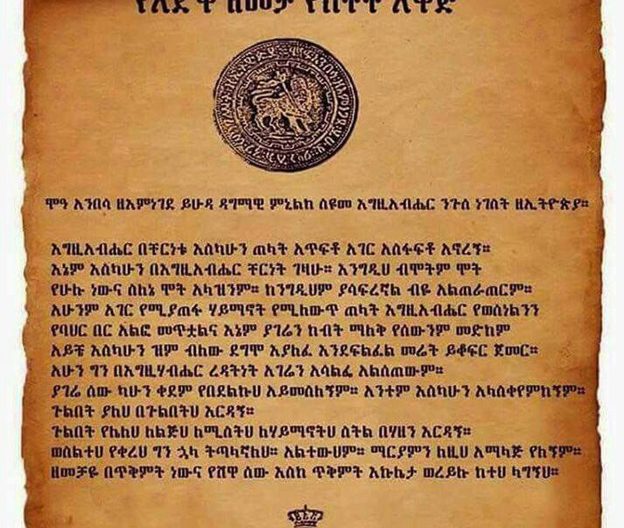
One hundred twenty five years back, emperor Menelik II issued a war decree calling the people of Ethiopia to stand in unison and click with the king in the fight against the Italian colonial power following the breaching of the Wuchale treaty in which a wrongly-Amharic- to-Italian-translated binding agreement was secretly inserted so that Ethiopia will be obliged to undertake every diplomatic move through the acknowledgement (tutelage) of Italy. The decree Menelik issued to mobilize his people to the battle of Adwa read as follows.
“God in His goodness has so far enabled me to see the destruction of my enemy, enlargement of my country. So far I have ruled my country by the grace of God. Hereafter, if I die I do not lament my death since death belongs to all. And God has never ashamed me. Then I have no doubt that he will make me ashamed now. The enemy, who destroyed a country and coerced conversion, is crossing the sea-gate that God has ordained for us. Though I left the enemies on the backburner understanding the perishing of my country’s cattle and the exhaustion of the people, they have continued to dig our land like mole rat.
But now, with the help of God, I won’t betray my country. My countrymen, I do not think I have offended you before. You have not offended me too. You, who are strong, help me with your strength. Those who have no vigor, help me in your prayer for your child, wife, and your religion. The rest of you who fight shy of will confront me later; I will get even with you! I swear in the name of St. Mary! I have no intercessor for this! My campaign is in October, so let the people of Shoa meet me at Were Ilu until the middle of October.”
Though this decree dates back to 125 years, it is still a legendary imperial manuscript referred by many Ethiopians and other historians while elaborating or analyzing about the accomplishment and background of the victory of Adwa. The decree is one of the major inputs to the victory through mobilizing the people across the country to flock to the battle in order to keep the independence of its motherland.
In the decree, Emperor Menelik II mentions various issues about the situation of his country and the national threat it faced by the time, thereby the people must cooperate to overcome the problem. He mentioned that Ethiopia has faced a major problem posed by its enemy that gain advance to get into the middle of the country passing the sea-gate which incorporates the northern parts of the country including the Red Sea. The king ascribes the “Kifu Ken/bad days” drought that resulted in the perishing of many cattle and the exhaustion of the people as a reason for not instantly respond to the invasion.
The emperor described the enemy as a “culprit that can destroy a country and commit forced conversion.” This has something to do with colonialists’ intention to dismantling the historic self-governance and culture of Africans. Similarly, these colonialists are also ill-famed for discrediting people’s values and beliefs. On the other hand, the Ethiopian people are conservative when it comes to its religion. That is why the king tried to warn the people that they will be coerced to lose their religion forcefully unless the stand against this enemy.
He also appealed to the people to stand beside him either in confronting the enemy at warfront or in their prayers. He pleaded them to do it for the sake of their children, spouses or religion. However, the king expressed his punitive measures in the decree against those who backpedal to his call.
The decree demonstrates the king’s commitment to defend his country from the enemy with the help of God. Thanks to the unity and patriotic zeal of the people, the country finally defended itself from foreign invaders and became the only African nation not to be colonized by European powers. This shining history is remembered as the Victory of Adwa in which the country celebrates it on the first of March each year.
The decree that King Menelik issued to collaborate the people had finally bear fruits of freedom and kept the sovereignty of the state. Thus both the king and the decree have special place in the heart of Ethiopians. And the king is still praised by many Africans and other black people as icon of black victory. Let the spirit of this victory be up on us.
BY YOHANES JEMANEH
THE ETHIOPIAN HERALD SUNDAY EDITION 27 FEBRUARY 2022





